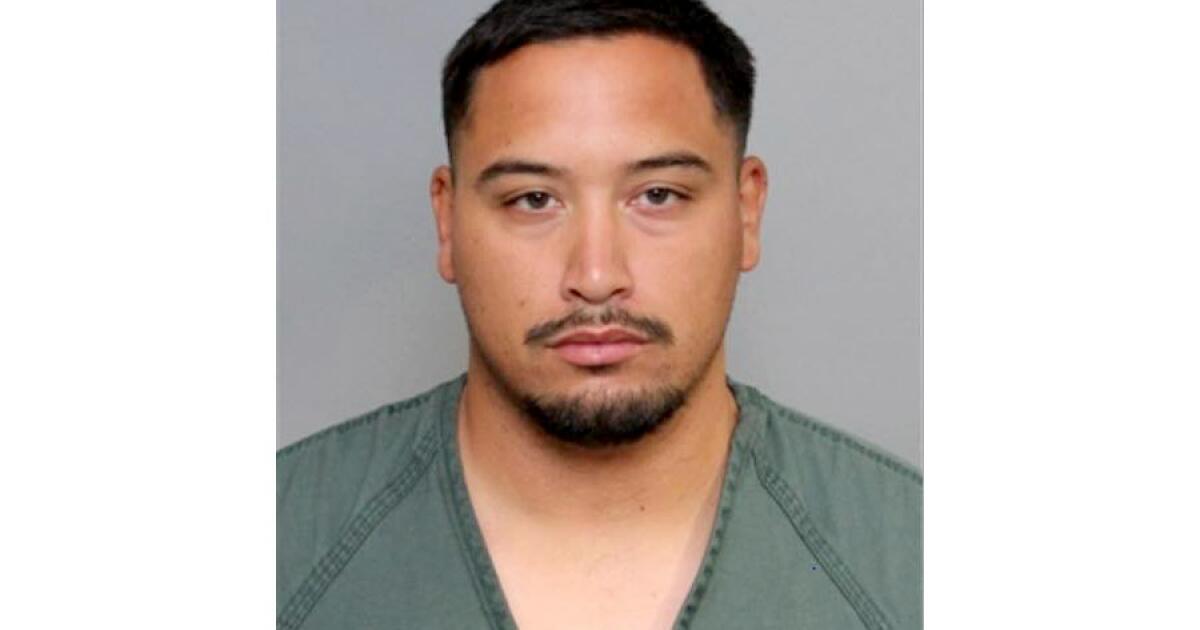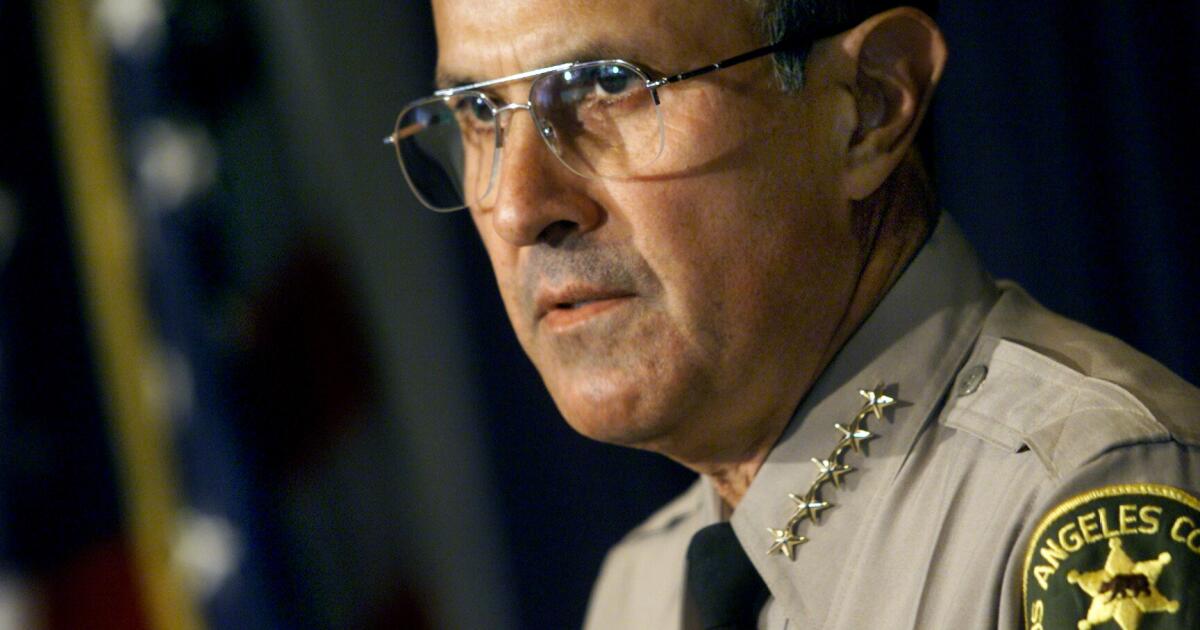World News
Officials rule the death of South LA teen Shaylee Mejia accidental.

The Los Angeles County medical examiner has ruled a 16-year-old girl’s death from blunt force head trauma an accident, raising questions from her family about how thorough and conclusive officials have been with the case.
The girl’s mother has pointed to video from a shocking school fight that showed her daughter, Shaylee Mejia, hitting her head during the melee just days before she died. Her mother, Maria Juarez, blames the high school for failing to protect her daughter, and doesn’t understand how the medical examiner could rule the death an accident.
The determination of the manner and cause of the girl’s death is just one of thousands made by experts each year in Los Angeles County — most of which go without much notice, while others, such as the case of Shaylee, have raised questions about the process.
Juarez told Univision this week that the determination, made last weekend, has left her outraged and disappointed.
“I don’t know why they would call it an accident,” said Luis Carrillo, a civil rights attorney representing Juarez. He said he requested information about how officials came to such a conclusion, but no further details have been shared. He didn’t know if the medical examiner’s investigation included reviewing the cell phone video from the fight.
The deputy medical examiner “should see those videos before she absolutely determines it was an accident,” Carrillo said.
The Times has requested the final autopsy report, but it hasn’t yet been completed. Odey Upko, the chief medical examiner in Los Angeles County, declined to comment on the case pending that final report.
Carrillo and Juarez are now considering obtaining an independent autopsy, Carrillo said.
While finding the manner of death an accident doesn’t automatically close a case, a spokesperson for the Los Angeles Police Department said Friday that the probe into Shaylee’s death has been completed, citing the accidental death determination. He did not cite any further evidence and referred further questions to the medical examiner’s office.
An LAPD spokesperson had previously said Shaylee had fallen before her death, but few other details were provided.
Carrillo said he is still looking into the case with plans to eventually file a lawsuit.
The Times spoke with forensic pathologist experts about what an accidental death ruling means, how such a decision is made and if that determination could eventually change.
What is a ‘manner of death’?
The manner of death is one of the two major determinations made following an autopsy, along with the cause of death.
“The manner of death is about the circumstances,” Upko said. This is a determination for how an injury or disease led to someone’s death.
There are five possible conclusions for the manner of death:
- Natural: when a medical issue causes a death, such as a disease, heart attack or pneumonia.
- Suicide: when someone takes their own life in an intentional act of self-harm.
- Homicide: when the death is the result of another individual, such as from a shooting, stabbing or fight.
- Accident: when a death is caused by something unnatural but was also unintentional. This can be a car crash, an overdose or a deadly fall.
- Undetermined: if an investigator cannot find enough evidence to substantiate a determination, this will be the finding. This is rarely used by medical examiners, experts said.
This determination is made after the body is examined in an autopsy and an additional investigation is done, said Iain M. McIntyre, a forensic toxicologist consultant who previously worked for almost 20 years at the San Diego County Medical Examiner’s office.
“Often times the manner of death is not obvious even after the autopsy,” McIntyre said.
How is that different from cause of death?
“The cause of death is most often the medical reason why the person died, …or what actually is responsible for the death,” McIntyre said. This is usually quite clear from the autopsy, he said, unlike the manner of death, which often takes more time.
“The manner of death can take a while if the circumstance is not very clear,” Upko said.
While there are only five options for the manner of death, there are many options for the cause of death — often with multiple reasons contributing to a death.
How do forensic pathologists make such a decision?
“Once you determine the cause of death, that’s the first step, then manner of death is the second step,” Ukpo said.
McIntyre said the medical examiner will consider everything available.
“Hospital records, police reports, reports from their own investigators, toxicology, histology reports,” McIntyre said, “and obviously autopsy findings.”
Medical examiners do their own independent investigation to determine the manner of death, but Upko said investigators can also consider police reports or other investigative information.
“Ideally, what we’re supposed to do is independently investigate and look at the body on our own,” Upko said. But, he said “we can gather information from [a law enforcement] investigation as well.”
Cases in which an injury led to a death can make determining the manner of death challenging, the experts said, especially when trying to distinguish between an accident or a homicide.
“You can’t make a determination just from the physical injury,” McIntyre said.
McIntyre and Upko both said a manner-of-death determination can change if new information later becomes available.
Upko said videos can also be relevant to such an investigation, but he called that very rare. He declined to say whether investigators reviewed video in Shaylee’s probe.
How is that determination used?
Both experts said it’s important to understand that the manner of death is a medical determination, not a legal one. So law enforcement and prosecutors can use the medical examiner’s findings in their cases, but that doesn’t determine what happens in the criminal justice system.
“The legal system works differently,” McIntyre said. For example, the manner of death could be ruled a homicide, but it may not be a crime — such as in cases of self defense.
There are also ways an accidental death could result in someone being held criminally responsible or liable in civil court, such as an overdose death in which officials prosecute the drug dealer.
World News
Newsom urges Oakland officials to tighten ‘extreme’ policy that restricts police chases

California Gov. Gavin Newsom, a Democrat, called on Oakland officials Friday to amend an “extreme” policy that generally only allows police to chase suspected criminals in cases of “violent forcible crimes.”
The governor sent a letter to Oakland Mayor Sheng Thao, the Oakland City Council and the Oakland Police Commission urging them to reconsider the Oakland Police Department (OPD) policy that limits officers’ ability to pursue suspects.
“Although some California jurisdictions allow vehicle pursuits for only certain crimes (e.g., felonies), Oakland is an outlier by imposing exceptional restrictions on OPD’s ability to police criminal activity, generally permitting pursuits only for ‘violent forcible crimes,’ as defined in OPD’s policy, and crimes involving firearms,” Newsom wrote.
The letter said that, unlike most other jurisdictions in the state, local police in Oakland are prohibited from pursuing people suspected of committing various felonies and any misdemeanor, including those that are violent, as well as other offenses that endanger public safety, such as reckless driving, sideshow activity and driving under the influence of drugs or alcohol.
GOV NEWSOM ORDERS HOMELESS ENCAMPMENTS TORN DOWN ACROSS CALIFORNIA: ‘NO MORE EXCUSES’

California Gov. Gavin Newsom speaks in Sacramento, California, Jan. 10, 2023. (AP Photo/José Luis Villegas, File)
“I am mindful of the sensitivities around vehicle pursuits, which can be dangerous to police, suspects, and innocent bystanders,” the governor wrote. “California’s Commission on Peace Officer Standards and Training recognizes and addresses this in its standard-setting guidance. But there is also extreme danger to the public in allowing criminals to act with impunity, and the reckless driving associated with sideshows and other criminal acts is a significant threat to public safety — as witnessed regularly by the public in viral videos and news coverage.”
This comes after Newsom’s recent move to increase California Highway Patrol (CHP) in Oakland to conduct surge operations targeting organized crime, sideshows, carjackings and other criminal activity.
Newsom said the move quickly produced several arrests of suspects accused of committing these crimes. Two days after the governor’s announcement, the CHP used ground and airborne assets to conduct a surge operation targeting sideshows. Several vehicle pursuits through that operation led to five felony arrests, eight DUIs, the recovery of eight stolen vehicles and the seizure of two guns.
“In the course of the CHP’s operations, however, they have observed, based on their professional law enforcement experience and expertise, certain dynamics that are contributing to Oakland’s public safety challenges,” Newsom wrote in the letter. “In particular, the CHP has brought to my attention that they observed criminals often fleeing with impunity because it’s common knowledge that the Oakland Police Department’s (‘OPD’) pursuit policy allows vehicle pursuits in only very limited circumstances.”
Newsom said CHP observed suspects attempting to avoid arrest by using the same routes, meaning that the suspects knew where OPD would stop chasing them. But, the governor said, the suspects were unable to avoid the six pursuits initiated by CHP, which had a number of resources available to them, including air support.

California Gov. Gavin Newsom speaks at a news conference in Sacramento, California, Thursday, March 16, 2023. (AP Photo/Rich Pedroncelli)
CLICK HERE TO GET THE FOX NEWS APP
“Any policy on vehicle pursuits must be clear-eyed in balancing the risks and benefits involved,” Newsom’s letter read. “Because of Oakland’s public safety challenges and the degree to which OPD’s pursuit policy is an outlier among California law enforcement agencies, I support the recent action by the City Council to direct a review of this policy.
“I urge you to reconsider whether OPD should be permitted to pursue suspects in more circumstances to improve public safety in your city and to establish a process to evaluate whether OPD is making full use of its authority, including that granted under the existing pursuit policy, to protect public safety and enforce the law,” he continued.
Newsom concluded his letter by saying he is committed to improving public safety in Oakland and across California. He said there have been some recent improvements in public safety, but that officials “owe it to our communities to continue to search for solutions.”
World News
France travel disruption expected to last for days

French rail company SNCF has warned that disruption from Friday’s sabotage against the country’s train network could last until the end of the weekend and affect hundreds of thousands more passengers.
Coordinated arson attacks on three lines of the high-speed TGV network on Friday caused chaos for travellers, hours before the opening ceremony for the Paris Olympics. A fourth attack was thwarted by rail workers.
Prime Minister Gabriel Attal described the attacks as “acts of sabotage”.
About a quarter of international Eurostar trains were also cancelled, with UK Prime Minister Keir Starmer among those affected.
In a statement issued on Friday evening, SNCF said traffic “would improve” on affected lines on Saturday thanks to the work of thousands of rail workers.
It said:
- On the eastern line, trains would run normally from 06:00 (05:00 BST) on Saturday
- On the northern line, 80% of trains would be running, with delays of 1-2 hours
- On the south-western line, 60% of trains would be running, with delays of 1-2 hours
The company added that customers whose trains are delayed or cancelled will be contacted by email or text message.
Eurostar said it expected about a fifth of services over the weekend would be cancelled, while all trains would face delays of around 1.5 hours. Eurostar services use the northern high-speed line.
SNCF said surveillance of the rail network had been strengthened “on land and in the air,” using 1,000 workers and 50 drones.
Junior Transport Minister Patrice Vergriete said around 250,000 people had been affected on Friday, while up to 800,000 could face delays and cancellations by Monday.
He added that disrupting holiday travel, rather than Friday’s Olympic opening ceremony, was the most likely aim of the saboteurs.
“There is not necessarily a link” with the Olympics, he said in an interview.
Friday 26 July traditionally marks the start of the grand départ (big getaway) for many French holidaymakers heading out of the cities.
No group has yet claimed that it was behind the attacks. A source linked to the investigation told the AFP news agency that the operation was “well prepared” and organised by “a single structure”.
Mr Attal said security forces were searching for those responsible.
At around 04:00 on Friday, saboteurs cut and set on fire specialised fibre optic cables essential for the safe functioning of the rail network, government officials said.
One site was at Courtalain, 150km (93 miles) south-west of Paris. A picture posted online purportedly showed burnt-out cables in a shallow gulley with its protective SNCF paving stones discarded.
The SNCF spoke of a “massive, large-scale attack aimed at paralysing” its services, not just at Courtalain but at Pagny-sur-Moselle, a village outside the eastern city of Metz and Croisilles, not far from the northern city of Arras.
Another attempted attack in Vergigny, south-east of Paris, was foiled by SNCF workers who were carrying out maintenance on site in the early hours of Friday.
Prosecutors have opened an investigation into attacks on “the fundamental interests of the nation”.
World News
‘Firenado’ spotted above explosive Park fire near Chico

As the state’s largest wildfire of the year was doubling in size Thursday evening, explosive flames spun up into the atmosphere, swirling in a way that can only be described as tornado-like — a real life example of the firenado phenomenon.
Video of the massive fire whirl was captured by AlertCalifornia wildfire cameras, displaying the extreme fire behavior that is driving the massive and fast-moving Park fire across Butte and Tahoma counties.
The blaze has grown past 178,000 acres as of Friday afternoon, forcing thousands of evacuations and burning more than 100 buildings. Officials say the fire started Wednesday in Chico due to an act of arson.
“At this point, the fire is kind of creating its own weather, and that can be pretty unpredictable,” said Courtney Carpenter, a meteorologist with the National Weather Service in Sacramento. “Really big, explosive wildfires can create thunderstorms. They can make whirling fire plumes that can mimic tornadoes.”
Meteorologists tracked those massive, rotating smoke plumes on the radar Thursday night, Carpenter said, a characteristic of “explosive fire growth.”
She said the wildfire also generated thunderstorm clouds, but didn’t quite trigger lightning, which some particularly unstable fires have created before.
Watching the fire produce massive smoke rotations — and maybe even several vorteces — showed off the blaze’s rare and powerful nature, said Daniel Swain, a climate scientist at UCLA, on his YouTube channel. He said the Park fire had “super-cell thunderstorm-like characteristics.”
There is growing recognition that extreme wildfires can produce other dangerous phenomena that are not directly related to the flames alone, Swain said.
It’s not unusual to see fires modify their environment by causing localized wind currents, but large fires such as the Park fire can even start to “generate their own Mesoscale weather systems that look a lot like severe thunderstorms,” he said.
He added that new research is also finding that climate change is increasing the magnitude and frequency of such behavior, as well as bringing it to new regions.
“There is evidence that these large and potentially dangerous pyro-cumulonimbus events are increasing in a warming climate as fire intensity increases,” he said.
Carpenter said the weather service doesn’t issue tornado warnings when fire whirls develop because residents in the area should already be evacuated. More than 4,000 people have been issued evacuation orders from communities in and around northeast Chico and in parts of southern Tehama County.
“We urge people to follow the local orders from local officials,” Carpenter said. “Keep an eye on things and be ready to go if you live in the vicinity of the fire.”
-

 African History5 years ago
African History5 years agoA Closer Look: Afro-Mexicans 🇲🇽
-

 African History6 months ago
African History6 months agoBlack History Facts I had to Learn on My Own pt.6 📜
-

 African History5 years ago
African History5 years agoA Closer Look: Afro-Mexicans 🇲🇽
-

 African History1 year ago
African History1 year agoMajor African Tribes taken away during the Atlantic Slave Trade🌍 #slavetrade #africanamericanhistory
-

 African History1 year ago
African History1 year agoCameroon 🇨🇲 World Cup History (1962-2022) #football #realmadrid #shorts
-

 African History6 months ago
African History6 months agoBlack History Inventors: Mary Kenner 🩸
-

 African History1 year ago
African History1 year agoNo African pre-Columbus DNA? 🤯🤯 #history #mesoamerica #mexico #african
-

 African History1 year ago
African History1 year agoOrigin Of ‘Cameroon’ 🇨🇲😳#africa






























